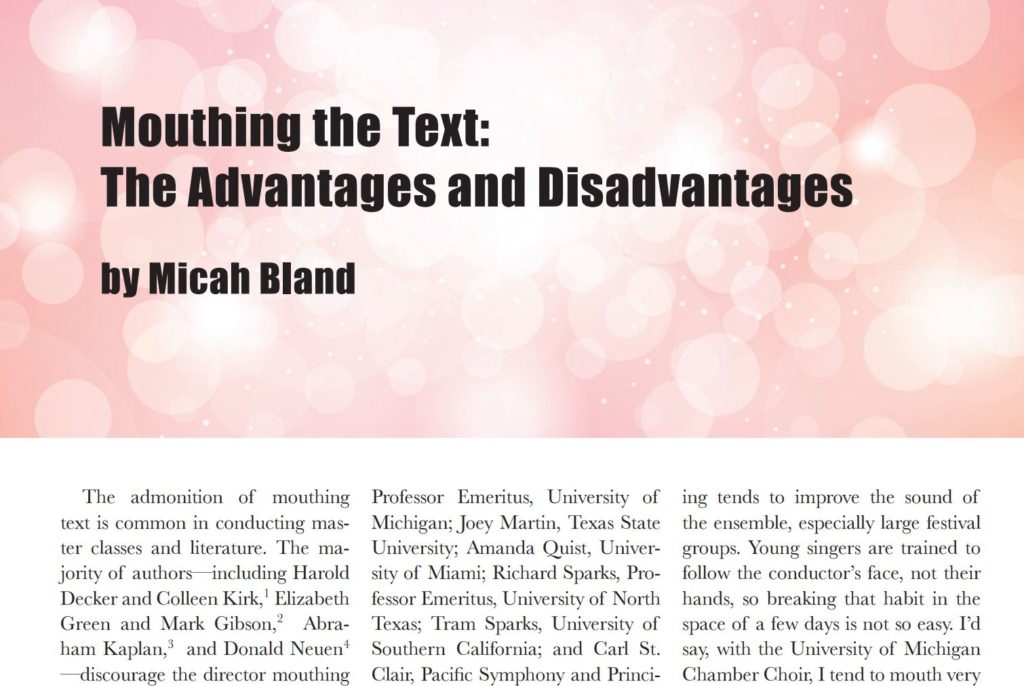
_____________________________
The May 2020 issue of Choral Journal features an article titled “Mouthing the Text: The Advantages and Disadvantages” by Micah Bland. This is a fascinating interview, and you can read it in its entirety online at acda.org/choraljournal. Below is the first question of the interview.
_____________________________
As a conductor, what percentage of time in performance do you find yourself mouthing the words?
Jeffery Ames: 25%
Hilary Apfelstadt: As little as possible. Likely the maximum would be 15–20% of the time.
Jerry Blackstone: I’m probably the wrong person to ask about how much I mouth words, since mouthing is often unintentional. I do, however, try to not mouth words unless it is for a specific purpose, such as vowel improvement, unanimity, etc. I find that with younger singers, mouthing tends to improve the sound of the ensemble, especially large festival groups. Young singers are trained to follow the conductor’s face, not their hands, so breaking that habit in the space of a few days is not so easy. I’d say, with the University of Michigan Chamber Choir, I tend to mouth very little. They are trained musicians able to ascertain the conductor’s intention quite quickly from communicative gestures. Perhaps 15% of the time.
Joey Martin: The percentage of time varies from ensemble to ensemble based on their needs. With advanced university groups, I rarely mouth the words. With less experienced ensembles I mouth about 20% of the time.
Amanda Quist: This is hard to say without watching a video of myself conduct. I believe it changes with the ensemble; if I am trying to inform vowel shape, then it may happen more. Hopefully not more than about 20% of the time.
Richard Sparks: Too much, although I’ve never counted percentage!
Tram Sparks: Since I have been on the faculty at USC, I have not conducted an ensemble on a regular basis. However, while a choral faculty member at Temple University (1999–2009) and as conductor of several ensembles over the course of my time there (Women’s Chorus, University Singers, University Chorale, Concert Choir), I found myself mouthing words on occasion, e.g. significant words or words at important entrances. As far as I am aware (I think conductors typically have an inaccurate view of their own practice unless documented by videos), when mouthing, I usually would form the vowel shape, as if to visually “place” the phrase. Personal video footage generally shows more vowel formation than mouthing of sentences or entire phrases.
Carl St. Clair: I am not one to do this as a matter of course and certainly do not employ this as a substitute for nonverbal conducting gestures and communications, but if there are particularly favorite moments or texts, I might sing along with a singer or chorus. I can think of a few places, such as in Mahler’s Ich bin der Welt abhanden gekommen, or some of Hesse’s incredible texts in Strauss’ setting of his Vier letzte Lieder, when I just can’t resist singing along. I am sure there are such moments in Beethoven’s 9th as well. But, at this moment I am not “mouthing” words, I am literally singing along because I love it so much. I suppose that in every opera, choral work or works with singers there are such beautiful moments which I just can’t escape participating. That said, I would never sing so loudly that almost anyone would hear it. No one would buy a ticket to hear my voice.
_____________________________
Read the rest of this article (and more!) in the May 2020 issue of Choral Journal, available online at acda.org.


Leave a Reply
You must be logged in to post a comment.